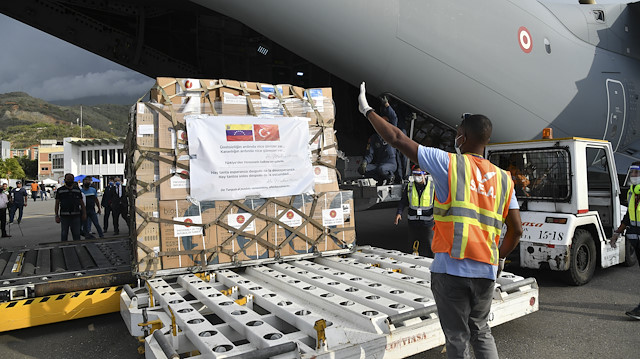
Effective collaboration in health sector between two countries began long before pandemic, says Turkey's envoy to Caracas
Turkey's ambassador to Venezuela has said Ankara's aid is enabling Latin America to "effectively" combat the coronavirus pandemic.
Sevki Mutevellioglu told Anadolu Agency last week Turkish aid, including 25 ventilators, 40,000 testing kits, 150,000 masks and protective clothing, reached the capital Caracas.
He noted that the aircraft was also carrying medical equipment donated to Venezuela as part of various health projects supervised by the Turkish Cooperation and Coordination Agency (TIKA).
The ambassador said the Venezuelan side welcomed the aid as its economy is crippled by sanctions.
Mutevellioglu praised the "fast, effective and accurate" response of President Nicolas Maduro's government.
Noting that the ventilators and other supplies were Turkey-made, he said it would contribute to Turkey's export potential in this area.
He added the aircraft also evacuated four Turkish citizens from Venezuela on its return.
- Collaboration in health sector began before virus
Underlining that the cooperation between Turkey and Venezuela in the health sector began "much earlier" than the pandemic, he said TIKA has been running health projects in Venezuela for more than two years.
In 2018, many vital medical devices, including incubators, were donated by TIKA to Hugo Chavez Maternal and Child Hospital. It also sent medical aid to three hospitals in critical need in 2019.
The ambassador added that some patients who cannot find treatment options in Venezuela receive treatment in Turkey under a project of the Turkish Health Ministry and this project will be continued in the future.
Despite coronavirus, bilateral trade cooperation continues strengthening, Mutevellioglu said, adding that "the bilateral trade volume in the first six months of 2020 showed remarkable improvement compared to last year."
Venezuela has recorded 124 deaths and nearly 7,500 recoveries so far, according to a running tally of the US-based Johns Hopkins University.
* Beyza Binnur Donmez in Ankara contributed to the story
Hello, the comments you share on our site are a valuable resource for other users. Please respect other users and different opinions. Do not use rude, offensive, derogatory, or discriminatory language.
The floor is all yours.


